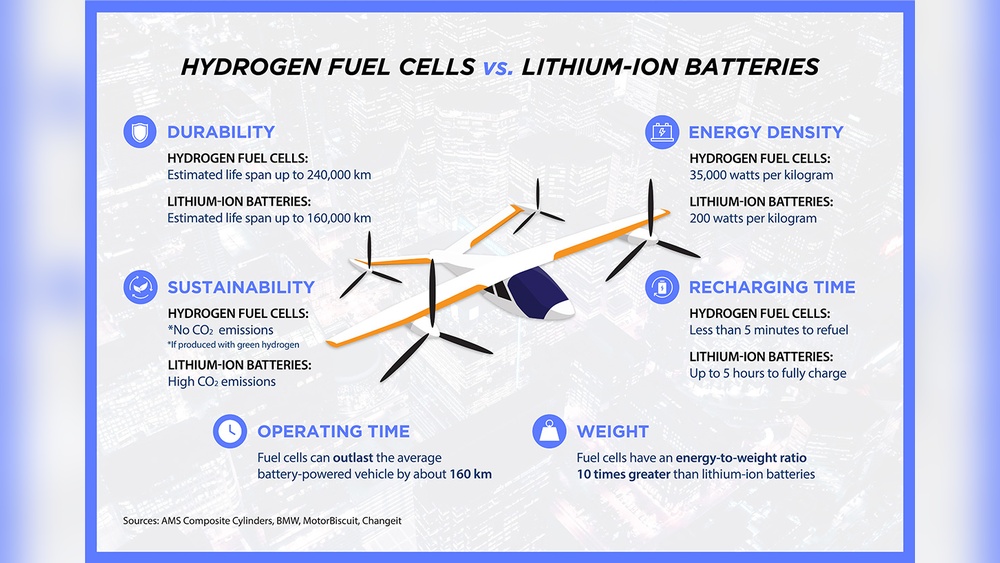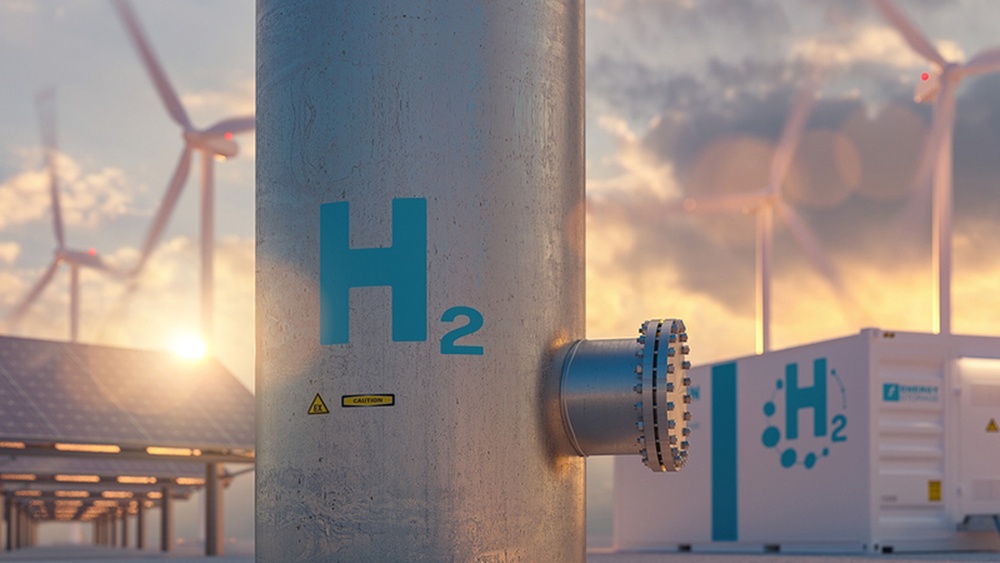Are you curious about which energy source will power the future—hydrogen fuel or lithium-ion batteries? If so, you’re not alone.
Both technologies promise cleaner, greener energy, but they come with very different strengths. What if you could discover why hydrogen fuel might be the smarter choice for your next vehicle, device, or energy solution? Imagine faster refueling, longer lifespans, and lighter weight—all contributing to a more efficient and sustainable experience.
Keep reading to explore the clear advantages hydrogen fuel holds over lithium-ion batteries and find out how this powerful alternative could transform your energy use for the better.
Energy Density Advantages
The energy density of a fuel source affects how much power it can store and deliver. Hydrogen fuel offers clear benefits in energy density compared to lithium-ion batteries. This difference plays a key role in many applications such as transportation and heavy industry. Higher energy density means longer operation times and lighter weight for the same amount of stored energy.
Hydrogen’s Superior Energy-to-weight Ratio
Hydrogen has one of the highest energy-to-weight ratios among fuels. It stores about three times more energy per kilogram than lithium-ion batteries. This means vehicles powered by hydrogen can travel longer distances without adding extra weight. Lightweight fuel systems improve efficiency and reduce strain on engines. Hydrogen’s weight advantage is especially important for airplanes and trucks where every kilo counts.
Comparing Storage Capacities
Lithium-ion batteries store energy within solid cells that add significant weight and volume. Hydrogen stores energy in a gaseous or liquid form, allowing for compact storage with less mass. It can be compressed or liquefied to fit into tanks efficiently. This flexibility helps design smaller, lighter fuel tanks. Vehicles using hydrogen need less space dedicated to energy storage, freeing room for passengers or cargo.
Environmental Impact
The environmental impact of energy sources plays a crucial role in choosing the best technology for the future. Hydrogen fuel offers clear benefits over lithium-ion batteries in this area. It produces less pollution and supports cleaner energy practices. This section highlights key advantages related to hydrogen fuel’s environmental impact.
Zero Emissions From Hydrogen Fuel
Hydrogen fuel cells produce only water vapor and heat as byproducts. They do not emit harmful gases or pollutants. This contrasts with lithium-ion batteries, which require energy from power plants that may burn fossil fuels. Using hydrogen fuel reduces air pollution and helps improve urban air quality.
Sustainability Of Hydrogen Production
Hydrogen can be produced using renewable energy sources like wind, solar, and hydro power. This makes hydrogen a sustainable energy carrier. Lithium-ion batteries rely on mining rare metals like cobalt and lithium, which harms the environment. Hydrogen production has a smaller ecological footprint and fewer resource limitations.
Reduced Carbon Footprint
Hydrogen fuel systems emit no carbon dioxide during operation. Their overall carbon footprint is lower when produced with green energy. Lithium-ion batteries generate carbon emissions during manufacturing and disposal. Hydrogen fuel helps reduce greenhouse gases and supports climate change goals.
Operational Benefits
Hydrogen fuel offers several operational advantages over lithium-ion batteries. These benefits make it a strong candidate for various energy needs. The focus here is on how hydrogen fuel improves performance and reduces downtime in practical use.
Longer Lifespan Of Fuel Cells
Hydrogen fuel cells generally last longer than lithium-ion batteries. They do not degrade as quickly with use. This means fewer replacements and less waste. Their stable performance over time supports continuous operations. This reliability is crucial for vehicles and machines that run daily.
Quick Refueling Times
Refueling hydrogen fuel cells takes only a few minutes. This is much faster compared to the hours needed for battery charging. Fast refueling reduces waiting periods and keeps equipment running. It supports high usage demands and increases productivity. This speed is a major advantage in transportation and industrial sectors.
Lower Maintenance And Operational Costs
Hydrogen fuel cells require less maintenance than lithium-ion batteries. They have fewer moving parts and simpler systems. This lowers the chances of breakdowns and repairs. Operational costs stay low over the lifespan of the fuel cells. Reduced maintenance means less downtime and fewer service expenses.

Energy Security And Diversification
Energy security and diversification are key factors in creating a sustainable energy future. Dependence on a single energy source can cause risks such as supply shortages and price spikes. Hydrogen fuel offers a promising alternative to lithium-ion batteries by broadening the range of energy sources and enhancing resilience.
Fuel Source Flexibility
Hydrogen fuel can be produced from various raw materials. It uses natural gas, biomass, and water through different methods. This flexibility reduces risks tied to one fuel type. Lithium-ion batteries rely heavily on specific metals like lithium and cobalt. These metals have limited sources and face supply chain issues. Hydrogen’s diverse fuel sources offer a more stable supply option.
Potential For Renewable Hydrogen
Hydrogen can be made using renewable energy such as wind and solar power. This process, called electrolysis, splits water into hydrogen and oxygen. Renewable hydrogen creates clean energy without pollution. Lithium-ion batteries store electricity but do not produce energy themselves. Using renewables to generate hydrogen supports a cleaner and more sustainable energy system.
Reducing Dependence On Lithium
Lithium is a key component in most batteries. Its mining and processing can harm the environment. Also, demand for lithium is growing fast, causing supply concerns. Hydrogen fuel reduces the need for lithium by offering a different energy storage method. This shift can ease pressure on lithium resources and lower environmental impact. It helps countries diversify their energy options and strengthen energy security.
Performance In Heavy-duty Applications
Hydrogen fuel shows strong performance in heavy-duty tasks. It provides consistent power for large machines and vehicles. Unlike lithium-ion batteries, hydrogen fuel cells do not lose efficiency over long use. They can quickly refuel, reducing downtime in demanding operations. These traits make hydrogen a practical energy source for tough industrial work.
Suitability For Transportation And Industry
Hydrogen fuel fits well in trucks, buses, and trains. These vehicles need long ranges and fast refueling. Lithium-ion batteries take hours to recharge, limiting their use in heavy transport. Hydrogen tanks refill in minutes, allowing continuous operation. Industries benefit from hydrogen’s high energy density to power machinery and forklifts. This helps maintain productivity in harsh conditions.
Noise Pollution Benefits
Hydrogen fuel cells operate quietly, reducing noise pollution. Heavy-duty engines often generate loud sounds that disturb communities. Using hydrogen lowers noise levels, creating a better environment. This is important in urban areas and workplaces. Quieter machines improve worker comfort and public health.

Challenges Facing Hydrogen Fuel
Hydrogen fuel offers many benefits, but it faces significant challenges. These challenges slow down its wide use in vehicles and energy systems. Understanding these hurdles helps us see what needs improvement.
Two major issues stand out: how to store hydrogen safely and the energy needed to produce it. Both affect cost and convenience.
Storage And Infrastructure Needs
Hydrogen is a very light gas and hard to store. It requires high pressure tanks or very cold temperatures. This makes storage expensive and complex.
Current fueling stations for hydrogen are scarce. Building more stations needs large investment and time. The lack of infrastructure limits hydrogen’s use in everyday cars.
Transporting hydrogen safely is another concern. It can leak easily and is highly flammable. These risks require strict safety measures and advanced technology.
Production Energy Requirements
Producing hydrogen mostly uses energy from natural gas or water electrolysis. Electrolysis splits water into hydrogen and oxygen using electricity. If this electricity is not from renewable sources, it adds pollution.
Hydrogen production needs a lot of energy. This high energy demand raises costs and reduces overall efficiency.
Improving production methods with clean energy can lower emissions. It can also make hydrogen fuel more affordable and greener in the future.
Future Outlook
The future of hydrogen fuel looks promising compared to lithium-ion batteries. Rapid advancements and growing interest boost hydrogen’s potential. Experts expect hydrogen to play a key role in clean energy. It offers long-lasting power with quick refueling times. These factors make hydrogen a strong candidate for future energy needs.
Technological Innovations
New technologies improve hydrogen storage and fuel cell efficiency. Researchers develop materials that increase energy output and reduce costs. These innovations make hydrogen systems lighter and more compact. Progress in electrolysis lowers the cost of producing green hydrogen. Better infrastructure for hydrogen distribution is also under development. These steps help hydrogen compete with lithium-ion batteries.
Market Adoption Trends
More industries are adopting hydrogen for transport and energy. Heavy-duty vehicles and public transport show strong demand for hydrogen fuel. Governments worldwide support hydrogen through incentives and funding. Investment in hydrogen projects grows every year. Companies focus on building refueling stations and supply chains. This trend signals hydrogen’s rising importance in the energy market.

Frequently Asked Questions
Are Hydrogen Batteries Better Than Lithium?
Hydrogen batteries offer higher energy density and longer lifespan than lithium-ion batteries. Lithium batteries degrade faster and need replacement. Hydrogen fuel cells produce zero emissions and refuel quickly. However, hydrogen storage and infrastructure remain challenging compared to widespread lithium technology.
Both have unique benefits for clean energy.
What Are The Advantages Of Hydrogen Fuel Cells Over Batteries?
Hydrogen fuel cells offer faster refueling, longer lifespan, higher energy density, and emit only water, unlike batteries that degrade and take longer to recharge.
Do Hydrogen Fuel Cells Last Longer Than Batteries?
Hydrogen fuel cells generally last longer than lithium-ion batteries. They produce electricity continuously with hydrogen supply. Batteries degrade and require replacement over time.
What Is The Biggest Advantage Of Using Hydrogen Fuel?
The biggest advantage of hydrogen fuel is its zero emissions, producing only water and offering quick refueling with high energy density.
Conclusion
Hydrogen fuel offers clear benefits over lithium-ion batteries. It stores more energy by weight and refuels much faster. Fuel cells produce only water as waste, making them cleaner. They last longer without losing power like batteries do. Hydrogen also supports a wider range of uses, especially in heavy transport.
While challenges remain, hydrogen’s strengths make it a strong energy option. This technology holds promise for a cleaner, more efficient future.

